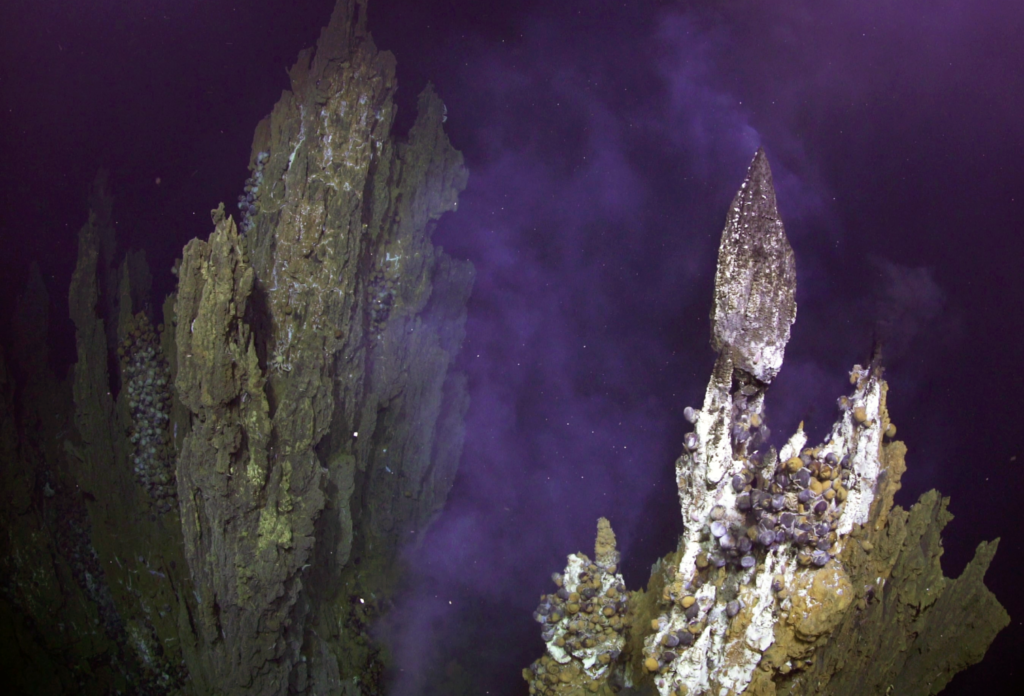DOSI Mini-Course: The Deep Sea, Humans & Management

Niua Spire, Schmidt Ocean Institute Cruise 2016. Image courtesy of Verena Tunnicliffe.
Ahead of a planned workshop in Fiji, postponed due to travel restrictions posed by COVID-19, DOSI hosted a virtual course “The Deep Sea, Humans, and Management”, designed for Pacific Islanders, in October 2020. The course was intended to reach ocean stakeholders from all backgrounds and knowledge levels, and is now freely available publicly as part of DOSI’s desire to drive open access science. In this course, deep-sea experts present content which spans science and policy, including deep-sea fishing, deep-seabed mining, and relevant conservation practices. This course is now available open access on our YouTube channel and below.
Introduction to the Deep Sea – Verena Tunnicliffe, University of Victoria, Canada
Verena Tunnicliffe is a marine biologist at University of Victoria in Canada where she held a Canada Research Chair in Deep Ocean Research until retirement in 2020. She combines a drive for ocean exploration with a passion to understand the nature and functions of novel communities. In this 20 minute introductory presentation from DOSI’s Pacific Islands Mini-Course, she introduces the various deep-sea habitats and the life they are host to.
Deep-Ocean Dynamics – Sabine Gollner, Royal Netherlands Institute for Sea Research (NIOZ)
Sabine Gollner is a deep-sea benthic ecologist at the department of Ocean Systems at the Royal Netherlands Institute for Sea Research (NIOZ). In this 20 minute presentation for the DOSI Pacific Islands Mini-Course she addresses deep-ocean dynamics – environmental conditions, heterogeneity, variability, disturbance and resilience.
Functions and Services of the Deep Sea – Andrew Thurber, Oregon State University, USA
Andrew Thurber is a deep-sea and polar ecosystem ecologist, working at the interface of microbial and animal ecology. A major focus of his work includes quantifying and communicating the ecosystem services provided by deep-sea habitats. In this 20 mins presentation, Andrew discusses how the deep sea is part of us, and of society, and helps to create a functioning earth that we all benefit from.
Seabed Mining – Diva Amon, Natural History Museum, London, UK
Diva Amon is a deep-sea biologist who works at the nexus of science, policy, and communications. She is also co-lead of the DOSI Minerals working group. In this 20mins presentation from DOSI’s Pacific Islands Mini-Course in October 2020, Diva considers the demand for metals in today’s society and subsequent increased interest in the extraction of minerals from the deep-sea bed. What are these minerals, how and where might they be mined and what do we know about the animals that live there?
The Mesopelagic Realm: connections to fisheries and mining – Jeffrey Drazen, University of Hawaii, Manoa
Jeffrey Drazen is a professor in the Department of Oceanography at University of Hawaii, who specialises in the trophic ecology of deep-sea fishes. In this 20mins presentation from DOSI’s Pacific Islands Mini-Course in October 2020, Jeff considers the mesopelagic zone – the area of the ocean between the surface and the seafloor – and the ways in which fisheries and deep sea-bed mining might intersect in this vast habitat.
Climate Change in the Deep Sea & Relevance to Management – Lisa Levin, Scripps Institution of Oceanography, University of California, USA
Lisa A. Levin is a Distinguished Professor of Biological Oceanography at the Scripps Institution of Oceanography, University of California, San Diego, and is co-lead for DOSI and the DOSI working group on Climate Change. In this 20mins presentation from the DOSI Pacific Islands Mini-Course, Lisa discusses the deep ocean in the context of climate change – highlighting changes in deep-sea conditions and working to achieve recognition of the deep sea at global climate change policy forums.
Marine Spatial Planning and Conservation in relation to Deep-Sea Mining – Anna Metaxas, Dalhousie University, Canada
Anna Metaxas is a Professor in Oceanography at Dalhousie University. In this 25 minutes presentation from DOSI’s Pacific Islands Mini-Course in October 2020, she introduces marine spatial planning in the deep sea. She also discusses strategic environmental assessments in relation to deep-sea mining as well as specific planning tools, including marine protected areas, and explains why incorporating ecological connectivity is so important for successful conservation outcomes.
Environmental Impact Assessment in the Deep Ocean – Malcolm Clark, National Institute of Water and Atmospheric Research (NIWA), New Zealand
Malcolm Clark is a Principal Scientist with NIWA in Wellington, New Zealand. His recent work focusses on evaluating environmental effects of human activities (such as commercial fishing and potential seabed mining), and development of ecological risk and impact assessments. In this 25mins presentation Malcolm introduces the Environmental Impact Assessment (EIA) process as well as the Environmental Management sequence, including risk assessment, acquiring baseline data and monitoring.
The Science-Policy Interface – Regional and International Policy – Harriet Harden-Davies, University of Wollongong, Australia & Katy Soapi, University of the South Pacific, Fiji
Harriet Harden-Davies is a Nippon Foundation Ocean Nexus postdoctoral research fellow at the Australian National Centre for Ocean Resources and Security, University of Wollongong. Her research is interdisciplinary and concerns global ocean governance, with a particular focus on the high seas. She is a Guest Investigator at Woods Hole Oceanographic Institute and co-lead of the Deep Ocean Stewardship Initiative.
Unfortunately a video recording is unavailable for Harriet’s presentation but her slides can be viewed HERE

